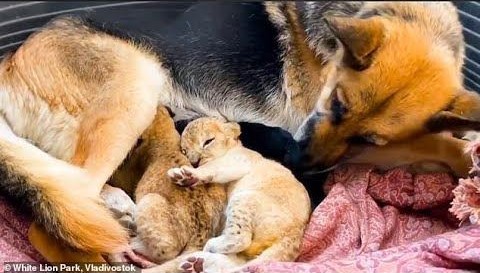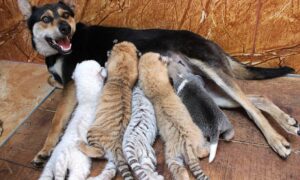Animals can surprise us with acts of care that cross species lines. At White Lion Park in Vladivostok, Russia, keepers faced a crisis when a first-time lioness, Sirona, behaved abnormally with her newborns—seen biting and ignoring them. Fearing the tiny cubs were emaciated and dehydrated, staff stepped in. Their answer was unexpected but lifesaving: they placed the two lion cubs with Sandra, an eight-year-old German Shepherd who had just had a puppy and was producing plenty of milk. What followed became one of those rare stories that shows how life sometimes finds a way through compassion and quick thinking.
A Problem No Keeper Wants to See
Keepers monitor first litters closely. New lion mothers can be anxious, confused, and sometimes rough as they learn how to nurse, clean, and protect. In Sirona’s case, the warning signs were clear: she was described as introverted and secretive, and video showed her biting one cub—abnormal, risky behavior for such fragile newborns. When a cub presents with a small wound, cries persistently, or fails to latch, minutes matter. Hypothermia, dehydration, and low blood sugar can spiral quickly in big-cat neonates.
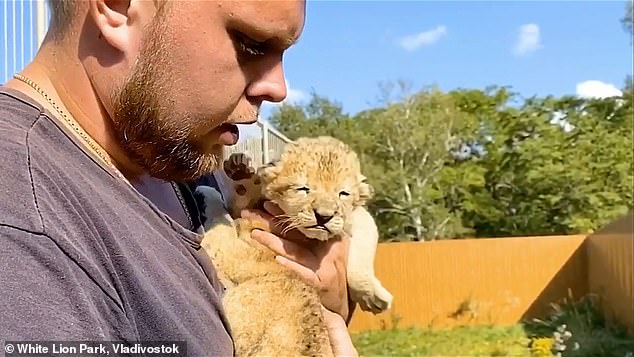
Why Cross-Fostering Was the Best Shot
Hand-rearing lion cubs with bottles is possible, but it’s intensive and risky. A healthier option—when possible—is cross-fostering to a lactating surrogate. A nursing dog can offer:
-
Warmth and constant contact that stabilizes heart rate and temperature.
-
Frequent small feeds that are hard to match with a bottle schedule.
-
Natural grooming that stimulates digestion and elimination.
-
Social comfort that lowers stress hormones, improving immunity and weight gain.
Sandra had a single puppy (smaller than the lion cubs), an ample milk supply (she previously nursed eight pups), and a calm temperament with humans. Although, as the park director joked, she “doesn’t like cats,” she accepted the little African lions into her nest—proof that maternal drive can be stronger than species boundaries.
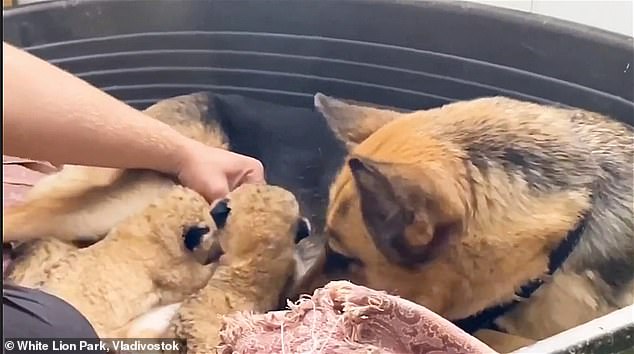
First 24 Hours: Stabilize, Feed, Observe
The first day is about triage and routine:
-
Hydration and warmth: cubs are dried, warmed, and checked for wounds.
-
Latch & milk transfer: handlers guide the cubs to a teat; steady swallowing means milk is moving.
-
Weight checks: measured before and after feeds—steady gain is the best signal the plan is working.
-
Behavior watch: are the cubs vocal, fussy, or quiet and content between feeds?
-
Dam acceptance: does Sandra allow nursing calmly, reposition for them, or push them away?
Park staff reported the male cub latched carefully and the female soon followed—a strong early sign of success.
👉 Read more uplifting life stories: Full Story: Man Loses 360 Pounds Naturally — Internet Rallies to Support His Next Step
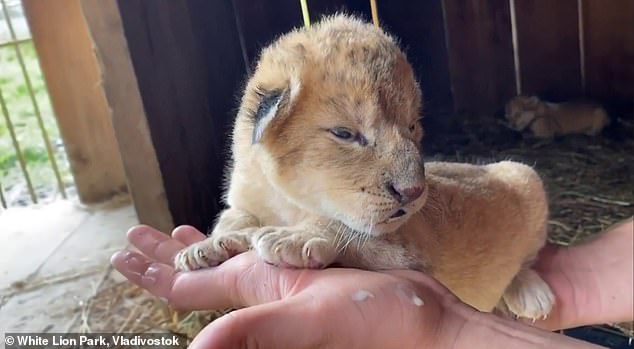
“But Isn’t Dog Milk Different From Lion Milk?”
Yes—each species’ milk has its own fat, protein, and carbohydrate profile. That said, healthy canine milk is nutrient-dense and can sustain big-cat neonates short-term when no lioness surrogate is available. Keepers typically:
-
Supplement with species-appropriate formula if weight gain stalls.
-
Micronutrients & probiotics: added as needed per the vet team.
-
Frequent weigh-ins: daily at first, then every other day once stable.
Survival is about adequate energy, warmth, and low stress. Dog milk, delivered consistently by a calm, protective surrogate, often beats bottle feeds in those first fragile weeks.
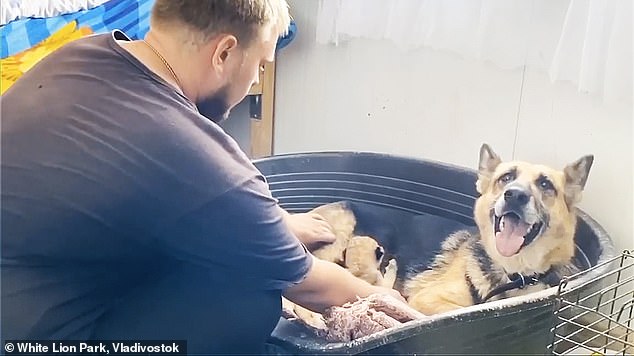
Managing Risks—Gently and Professionally
Cross-fostering is not set-and-forget. The team must balance:
-
Sandra’s health: her calorie and fluid intake must rise; her mammary glands are checked to prevent mastitis.
-
Puppy welfare: the biological pup should feed well and receive equal care; rotating teats can help.
-
Hygiene: clean bedding and careful handling to protect immature immune systems.
-
Behavioral safety: even gentle dogs can get overwhelmed; handlers supervise nursing sessions until everyone settles into a rhythm.
If a cub’s tiny wound needs attention, vets clean and monitor it so it heals while the cub continues to nurse.
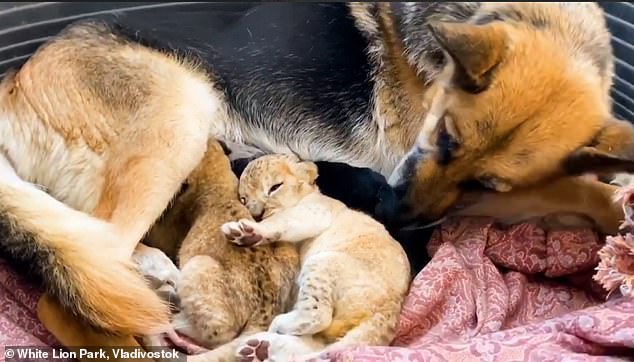
What Happens When Cubs Grow… Like Lions
Cubs will outgrow a canine surrogate fast. As teeth erupt and play turns rough, staff gradually transition:
-
From dog milk to a balanced formula, then to a soft, species-appropriate meat mash.
-
From the dog’s nest to a warm nursery space, with controlled introductions to keepers and, later, to safe peers.
-
Enrichment and social cues: toys, scents, and gentle handling mimic natural curiosity and help motor development.
Sandra’s role is precious but temporary; the park’s long-term plan focuses on healthy growth, socialization, and—where feasible—future integration with other lions under expert supervision.
Why Sirona Rejected the Cubs
New mothers can reject for many reasons:
-
Stress and inexperience (first litters are highest risk).
-
Health issues (pain, fever, mastitis).
-
Scent confusion if humans handled cubs too soon or too much.
-
Instinct misfires—rare, but documented in captive and wild felids.
Keepers didn’t demonize Sirona; they recognized an abnormal pattern and acted before the cubs declined beyond saving.
The Bigger Picture: What This Teaches About Animals and Life
This case touches the core of why we’re drawn to wildlife stories:
-
Maternal drive is powerful. A domestic dog that “doesn’t like cats” still recognized infant cues and responded.
-
Care is universal. Warmth, food, safety—these needs transcend species.
-
Good zoos plan for crisis. Protocols, vet support, and creative solutions can turn a near-tragedy into a second chance.
It also reminds us that life in human care demands humility. We celebrate wins like Sandra’s heroics while still striving for environments that reduce maternal stress and improve first-litter success for big cats.
Ethics: Doing Right by All Three
Cross-fostering means caring for three patients: the two cubs and Sandra (plus her puppy). Ethical care asks:
-
Is the dog choosing to nurse calmly, with breaks and comfort?
-
Do the cubs thrive—gaining weight, staying warm, healing?
-
Does the puppy get enough milk, attention, and healthy growth?
When the answer is “yes” across the board, cross-fostering is not only compassionate; it’s responsible.
A Keeper’s Quiet Triumph
The headline may celebrate a “faithful German Shepherd,” but it’s also a tribute to quiet professionalism—keepers observing closely, making hard calls fast, and supporting every animal involved. It’s the unglamorous work—night feeds, laundry, weight charts, temperature logs—that turns a viral moment into a sustainable outcome.
👉 Read next: The Hidden Meaning Behind Princess Diana’s Cannes Gown – A Heartfelt Farewell to Grace Kelly
Final Thoughts: When Care Crosses Species
In a world where we often divide creatures into “us” and “them,” Sandra and the lion cubs show a gentler reality: animals share needs that are simple and profound—warmth, safety, milk, touch. Sirona’s first-time struggle wasn’t a failure so much as a reminder that nature is imperfect and that good human care can fill the gap with empathy and skill.
For the two cubs, the story’s first chapter is survival. For Sandra, it’s maternal generosity, freely given. And for the rest of us, it’s a clear message: when we meet nature’s fragility with compassion and competence, life gets another chance. These are the stories worth telling—and the ones that keepers quietly work to create every day.
